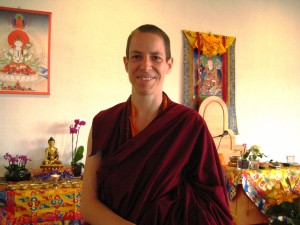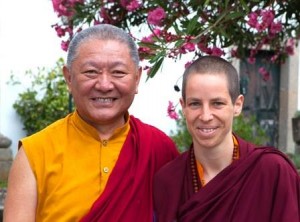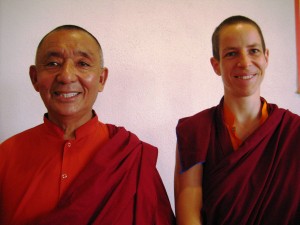Ani Wangmo at the Summer Camp at Casa da Torre in Portugal
Ani Wangmo’s story is similar to Tanya’s (see Conversation with Tatjana Popovic), except that Tanya had decided that after the three-year retreat she preferred not to return to monastic life, for the time-being at least. Ani Wangmo, on the other hand, took the robes and for the past 8-years she has been a nun. Every story about becoming a monk or a nun is different, and Ani Wangmo’s is no less engaging for being a personal account of the events in her life that brought her to a resolution to dedicate her life to the dharma.
Ani recalls her early experiences of becoming aware of eastern culture: I was going to university for some time and then, after I went to India for the first time, I never went back to university. When I heard that the Tibetans were actually in India, I decided I wanted to learn about Tibetan Buddhism. I knew they were in Tibet, but Tibet was a difficult place to reach from Slovenia. I didn’t know anyone who had been to Tibet but I knew quite a few people who had been to India as tourists…I decided to go to India to see for myself.
Having met some Tibetan monks in Ljubljana and asking where they came from, they told her they had a monastery near Dharamshala. According to them, getting there was no problem. Meditation in Slovenia was out of the question as there were no facilities for this, only new age things which appeared to Ani as being superficial. She was looking for something with more substance, something more essential and serious to do with meditation.
Deciding to go to India, Ani took her mother with her and auspiciously met His Holiness Karmapa on the second day in Dharamshala. The connection was quite clear. It was in 2000, just a few months after his escape escape. He was 15-years old.
Before she met him, she had seen a picture of him in Vienna. It’s kind of difficult to explain what happened when I saw the picture, but I knew that I had to meet him. I didn’t speak to His Holiness the first time because it was just a public audience; but soon after, we had a private audience also and then we talked to him a little bit through a translator. Ani’s mother was also impressed when meeting His Holiness Karmapa for the first time.
After two-months, Ani’s mother returned home. For another three-months, she remained in India and Nepal. After a stay at Kopan Monastery, Ani also visited Pullahari Monastery. On her next trip to India, she went to Sherab Ling, where she met her main teacher, Tai Situ Rinpoche, from whom she also took ordination just before starting a three-year retreat under the guidance of Ringu Tulku Rinpoche in Sikkim in 2006.
Anila with Ringu Tulku Rinpoche
She says of her commitment to become a nun, I really wanted to become a nun, from the very first time I heard about this possibility. I knew this was something I wanted to do but also didn’t want to do it right away because I saw so many people who have done it: then after a few months I thought, “No! This is not for me”. I didn’t want that to happen for me. Only when I was kind of sure, I let the wish be for a few years to see if it stayed, because the best way to check if you really want to do something, is not to do it but just to see if the wish stays in your mind. And sometimes, it’s not good just to jump into something and then you might regret it. I didn’t think I would regret it, but, you know what I’m trying to say. Sometimes it’s better just to let things be and see how it goes.
Ani has no regrets at all. She took the life vows to remain a nun after the retreat .
Karma is often a difficult concept for westerners, but Ani has a simple explanation of what it is. Having a past life is explained in the dharma: If you want to know your past, you just look at yourself now. So I think it’s quite clear that there is some connection. And if you want to know the future, just look at what you are doing now.
The conversation turned to freedom and Ani’s views were also straightforward. I don’t think freedom has to do with whatever you want to do. We think freedom is being able to do what we want, but does it really make us free? Does it make us feel happy? I don’t think so. Because when we talk, like in Buddhism, we have the discipline and the ethics and some people think that there are restrictions on their life. But actually, they give you the freedom to do whatever is good for you. So it’s more free once you follow these things: you’re more free than just listening to your own, selfish kind of thoughts. Freedom is more like being able to do what is good for you, not being able to do whatever you want to do which will bring you more problems after.
I know people who say, “I want to be free , and they leave their family and everything and they go to some exotic island and they start to live there on the beach. They can do whatever they want all year long. But if you meet those people, they are not any more free or any more happy than us.
We get to talking about the differences between theory expounded in the Buddhist texts and the experiential aspects of life and how to live it according to the prescribed methods of practice. Both the text and experience are necessary for transmission. If somebody doesn’t have the experience, nobody would understand the text. Ringu Tulku Rinpoche said His Holiness Karmapa was talking more from his own experience than about traditional teaching [on his recent visit to Europe]. When Rinpoche is talking about our practice, you know that he’s talking from his heart. He’s not saying how things should be, how things could be, he’s just telling us the way to do it and you know that he does it too. That’s what makes you able to access the teachings: and it reaches your heart, otherwise there is no connection.
Recently, on BBC Radio 4, there was a discussion about happiness, what it is and how it can be achieved. They really did get into a muddle. Ani’s ideas on happiness reflect her own experience and feelings about this subject. We all really want happiness. We look for happiness. All we are doing is doing things to get our happiness. But obviously, we don’t know the causes for happiness because we want happiness so badly that we’re creating the causes for suffering, for problems, for unhappiness. We don’t see this connection – not knowing what the real causes of happiness are.
Whatever happens in Ani la’s life, she has certainly found out what she wants as well as the courage to live it to the full.
Anila with Lama Shenga




Leave a Reply